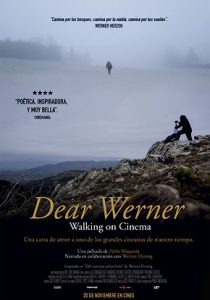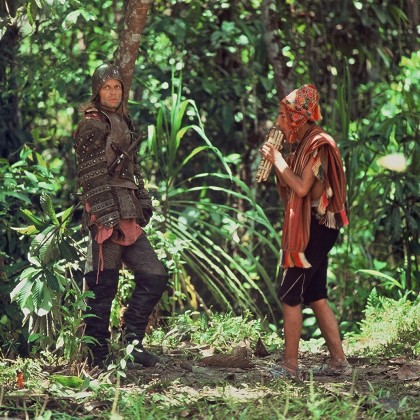Wri/Dir: Thomas von Steinaecker | With: Werner Herzog, Chloe Zhao, Joshua Oppenheimer, Patti Smith, Robert Pattinson, Carl Weathers, Wim Wenders, Christian Bale, Nicole Kidman | Volker Schlondorff | Klaus Kinski, Lotte Eisner | Doc Germany 102′:
Sometimes a question has to be asked that brings to mind what Bernard MacLaverty called the ‘elephant in the room.’ That is – who is a documentary like this for?
If you know Werner Herzog as a writer/director you will most likely find this film a slight trifle that only skims the surface of one of the most mythologised filmmakers, who is still with us. If, on the other hand, you know Herzog from his appearances on animated series and roles in such examples of America’s Movie Industrial Complex like The Mandalorian or Jack Reacher (as fun as they are) then this documentary will be an introduction to what Socrates meant when he claimed ‘the unexamined life is not worth living’ in the sense that, in the last fifteen years, Herzog has turned from an unique filmmaker who gave us visions of the imagined to a Pop Culture behemoth that at times touches on self parody; most definitely examined and lived in.
Radical Dreamer follows the 81-year-young filmmaker in LA and on a pilgrimage to the family home where he grew up. With a short running time the origin story is merely glimpsed as we focus on the stories that it seems everyone knows: the walk across Europe to save the life of Lotte Eisner (which Herzog detailed in his book Of Walking In Ice) and the lunacy of Klaus Kinski (which is better detailed in Herzog’s own 1999 documentary My Best Fiend).
One of the usual choices the director Thomas von Steinaecker makes is the selection of talking heads, half with German speakers and half with Anglo-Saxons. It is perhaps no surprise that the English speakers don’t really impart anything of interest and some of the choices are damn right bizarre, Carl Weathers, for example, who shared a scene with Herzog in The Mandalorian and the filmmaker Chloé Zhao. The German speakers have far more insight, and for that we could have stayed with them longer. They include Wim Wenders; two of Herzog’s brothers; his first wife and Volker Schlöndorff.
I think we need to look at this film as a primer, a ‘greatest hits’ package; if you will. It is certainly part of a media blitz that includes the release of his autobiography, a retrospective at the BFI Southbank and the re-issue at the cinema of some of his great films from the 70s. I do feel though that the films Herzog made in the 70s had a sense of mystery, and that he too seems an enigma: half holy fool and half the foremost example of his acclaimed ecstatic truth concept.
Back in the 70s, making those ethnographic hybrids (are they fiction, documentary or myth?) was a much younger man’s game and eventually, like all great artists, Herzog pivoted away from them and reimagined himself as a documentarian. His fiction films go to places that are undiscovered until he returns in documentary form to explore his claim that nature is uncaring and a devil’s fortress. @D_W_Mault
WERNER HERZOG: RADICAL DREAMER is in cinemas in the UK and Ireland on 19 January and on BFI Player and Blu-ray on 19 February. BFI Southbank’s retrospective season, JOURNEYS INTO THE UNKNOWN – FILMS BY WERNER HERZOG, runs throughout January.


